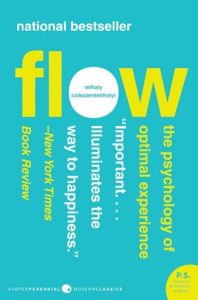Mihaly Csikszentmihalyi’s Flow: The Psychology of Optimal Experience, published in 1990, is one of the most influential books of its era; beyond psychology to business, leadership, and self-development. Csikszentmihalyi is Distinguished Professor of Psychology and Management, and the founder and co-director of the Quality of Life Research Center (QLRC) at Claremont Graduate University.
After a long career at the University of Chicago, he began teaching in Claremont in 1999, initially at the Drucker School. I interviewed him there in 2005 as background for my first book, Living in More Than One World: How Peter Drucker’s Wisdom Can Inspire and Transform Your Life. In 2003, I reviewed his book Good Business: Leadership, Flow and the Making of Meaning for USA TODAY. I described Csikszentmihalyi’s concept of Flow, in the context of that book, as: “being so absorbed in an activity that we shut out distractions and worries to devote all our energy to the task at hand. It can occur in work or play, but the focus here is how people can find flow when they work, and how leaders can encourage flow in employees.”
Here are 18 quotes from Flow that will energize your thinking, and your life, inside and outside the workplace:
-
“Action helps create inner order, but it has its drawbacks.” – page 226
-
“All forms of mental flow depend on memory, either directly or indirectly.” – page 121
-
“Because work is so universal, yet so varied, it makes a tremendous difference to one’s overall contentment whether what one does for a living is enjoyable or not.” – page 144
-
“Control over consciousness is not simply a cognitive skill.” – page 21
-
“Each of us has a picture, however vague, of what we would like to accomplish before we die.” – page 9
-
“The foremost reason happiness is so hard to achieve is that the universe was not designed with the comfort of human beings in mind.” – page 8
-
“Friendships allow us to express parts of our beings that we seldom have the opportunity to act out otherwise.” – page 188
-
“How we feel about ourselves, the joy we get from living, ultimately depend directly on how the mind filters and interprets everyday experiences.” – page 9
-
“However well-intentioned, books cannot give recipes for how to be happy.” – page 5
-
“In a sense, every individual is a historian of his or her own personal existence.” – page 132
-
“Many people have impressive record libraries, full of the most exquisite music ever produced, yet they fail to enjoy it.” – page 110
-
“Most people feel a nearly intolerable sense of emptiness when they are alone, especially with nothing specific to do.” – page 168
-
“One of the most frequently mentioned dimensions of the flow experience is that, while it lasts, one is able to forget all the unpleasant aspects of life.” – page 58
-
“Purpose gives direction to one’s efforts, but it does not necessarily make life easier.” – page 223
-
“To improve life one must improve the quality of experience.” – page 44
-
“We grow up believing that what counts most in our lives is that which will occur in the future.” – page 16
-
“Whatever one’s background, there are still many opportunities later on in life to draw meaning from the past.” – page 236
-
“When all a person’s relevant skills are needed to cope with the challenges of a situation, that person’s attention is completely absorbed by the activity.” – page 53

